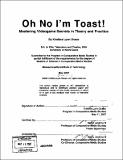Oh no I'm toast! : mastering videogame secrets in theory and practice
Author(s)
Drzaic, Kristina Lynn
DownloadFull printable version (7.185Mb)
Alternative title
Mastering videogame secrets in theory and practice
Other Contributors
Massachusetts Institute of Technology. Dept. of Comparative Media Studies.
Advisor
Henry Jenkins, III.
Terms of use
Metadata
Show full item recordAbstract
Secrets are a ubiquitous part of contemporary videogame design, yet are largely unexplored within academic discourse and often dismissed as extras. I contend that secrets play a fundamental and influential role within a given gamespace in terms of the way they affect a videogame design and player experience. As such this paper will investigate the nature of secrets in videogames. I shall find where secrets exist in a game and how they function as moments of gameplay. Then I will explore secrets historically and look at how the meaning of secrets have changed and evolved over time. It will be shown that secrets create a window to an underlying structure of gameplay, a meta-level that subverts the regular play of a videogame. Further, I will argue that secrets are a space where players engage in unstructured play, free from the constraints of a game design. Finally I will demonstrate how secrets can be used to personalize or redesign the experience of a videogame and/or remake the game design itself. In order to make this argument I will break down what secrets can mean specifically to players through two very differently structured games: The Legend of Zelda: Ocarina of Time and Animal Crossing. Knowing why secrets matter in a gamespace will reveal a reason for why videogames are compelling as a brave new form of media.
Description
Thesis (S.M.)--Massachusetts Institute of Technology, Dept. of Comparative Media Studies, 2007. Includes bibliographical references (p. 86-89).
Date issued
2007Publisher
Massachusetts Institute of Technology
Keywords
Comparative Media Studies.